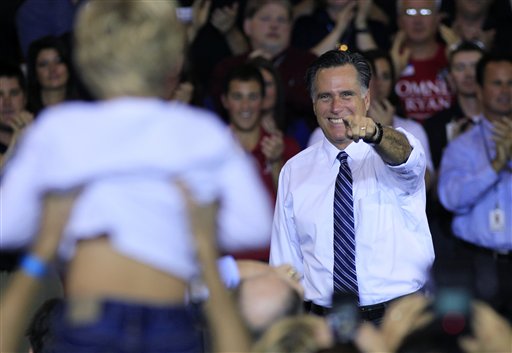Republican presidential nominee Mitt Romney aimed high in a speech on the economy in Ames, Iowa today, projecting a presidential demeanor while reiterating his proposals to increase growth and create jobs. The posture was as important as the policy, as the Romney campaign sought a contrast in tone with President Barack Obama’s re-election campaign, which has avoided the economy for smaller issues and personal attacks.
The plan Romney presented was the familiar five-point plan he discussed in the presidential debates, reduced from the detailed 59-point plan he had introduced earlier in the campaign: reduce the budget deficit; produce more domestic energy; expand free trade while punishing unfair trade; overhaul regulations; and improve job training and education.
To these, Romney added a pledge to protect entitlements by reforming them, and to improve health care by repealing Obamacare while providing coverage for those with pre-existing conditions.
Romney used the word “change” seventeen times in the speech–including four instances of “real change” and two of “big change:
This is an election of consequence. Our campaign is about big things, because we happen to believe that America faces big challenges. We recognize this is a year with a big choice, and the American people want to see big changes. And together we can bring real change to this country.
He tempered that emphasis on change by emphasizing some of the things he would keep the same, such as Medicare and Social Security. He cast himself as both a reformer–and a guardian.
At the same time, Romney did not shy away from attacking the president–not just on his policies and on his record, but on the tone of his campaign:
Four years ago, candidate Obama spoke to the scale of the times. Today, he shrinks from it, trying instead to distract our attention from the biggest issues to the smallest–from characters on Sesame Street and silly word games to misdirected personal attacks he knows are false.
The President’s campaign falls far short of the magnitude of the times. And the presidency of the last four years has fallen far short of the promises of his last campaign. Four years ago, America voted for a post-partisan president, but they have seen the most political of presidents, and a Washington in gridlock because of it.
Romney tied Obama’s petty and divisive style to his economic failures, suggesting that Obama’s failure to reach out across party lines had led to gridlock in Washington on fundamental issues such as the national debt. He emphasized–as he has done ever since the Republican convention–his own record of bipartisanship in government, as well as his past successes in business and in managing the Olympic Games in 2002.
He also told real-life stories of people suffering in the slow economic recovery–including, tellingly, a man from Waukesha, Wisconsin. The reference to Wisconsin–and the staging of the speech in Iowa–is a sign that Romney intends to compete for those states. A win in Wisconsin, or in both Iowa and Nevada, could seal an Electoral College victory for Romney even if he fails to win the hotly contested swing state of Ohio.
Much of the speech recounted the details of Obama’s shortcomings on the economy, including the sluggish 2 percent economic growth rate in the last quarter, which was an improvement from the previous quarter’s 1.3 percent but still leaves the economy on a pace to grow more slowly in 2012 than it had done the year before.
Yet Romney did not strike a harsh, critical tone, but a hopeful, albeit somber one, reminding voters–with a touch of political theatrics–of the importance of the 2012 election for the future of the country:
All elections matter. This one matters a great deal. Over the years of our nation’s history, choices our fellow citizens have made have changed the country’s course–they were turning points of defining consequence.
We are at a turning point today. Our national debt and liabilities threaten to crush our future, our economy struggles under the weight of government and fails to create essential growth and employment.
At the same time, emerging powers seek to shape the world in their image–China with its model of authoritarianism and, in a very different way, Jihadists with Sharia, repression, and terror for the world….
We face big challenges. But we also have big opportunities. New doors are open for us to sell our ideas and our products to the entire world. New technologies offer the promise of unbounded information and limitless innovation. New ideas are changing lives and hearts in diverse nations and among diverse peoples. If we seize the moment and rise to the occasion, the century ahead will be an American Century.

COMMENTS
Please let us know if you're having issues with commenting.